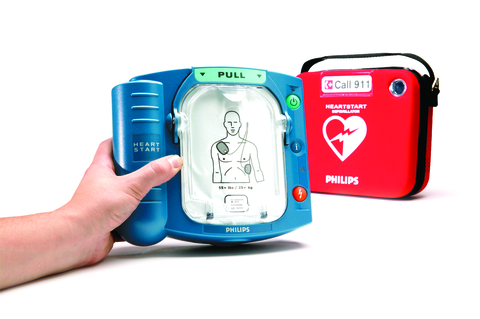text from the act,
Protection from civil liability, user of defibrillator
2. (1) Despite the rules of common law, a person described in subsection (2) who, in good faith, voluntarily and without reasonable expectation of compensation or reward uses a defibrillator on a person experiencing an emergency is not liable for damages that result from the person’s negligence in acting or failing to act while using the defibrillator, unless it is established that the damages were caused by the gross negligence of the person. 2007, c. 10, Sched. N, s. 2 (1).
Persons covered
(2) Subsection (1) applies to,
(a) a health care professional, if the health care professional does not use the defibrillator at a hospital or other place having appropriate health care facilities and equipment for the purpose of defibrillation; and
(b) an individual, other than a health care professional described in clause (a), who uses a defibrillator at the immediate scene of an emergency. 2007, c. 10, Sched. N, s. 2 (2).
Protection from civil liability, owner or operator of premises
3. (1) Despite the Occupiers’ Liability Act and the rules of common law, any person who owns or occupies premises where a defibrillator is made available for use and who acts in good faith with respect to the availability or use of the defibrillator is exempt from civil liability for any harm or damage that may occur from the use of the defibrillator. 2007, c. 10, Sched. N, s. 3 (1).
Exception
(2) Subsection (1) does not exempt the person who owns or occupies the premises where a defibrillator is made available for use from civil liability if,
(a) that person acts with gross negligence with respect to making the defibrillator available;
(b) that person fails to properly maintain the defibrillator; or
(c) the premises where the defibrillator is made available for use is a hospital or other premises used primarily for the purpose of providing health care to individuals. 2007, c. 10, Sched. N, s. 3 (2).
In this Act,
“defibrillator” means an automated external medical heart monitor and defibrillator that is capable of,
(a) recognizing the presence or absence of ventricular fibrillation or rapid ventricular tachycardia,
(b) determining, without intervention by an operator, whether defibrillation should be performed,
(c) automatically charging and requesting delivery of an electrical impulse to an individual’s heart as medically required, and
(d) satisfying any other criteria that may be prescribed by regulation; (“défibrillateur”)
The respective act is
Chase McEachern Act (Heart Defibrillator Civil Liability), 2007, S.O. 2007, c. 10, Sched. N



